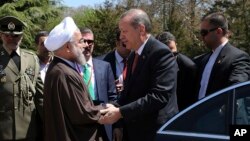There is a mixed reaction from the Turkish government to the nuclear deal negotiated with Iran by the P5 plus 1 countries. The prospect of the ending of Iranian sanctions is seen by Ankara as providing major trade opportunities but concerns remain that the settlement will strengthen its neighbor and only deepen the growing sectarian rivalry in the region.
Turkey’s economy minister Mehmet Simsek tweeted "great news for the Turkish economy,” on hearing the internationally negotiated deal with Iran over its nuclear program. Simsek predicted a surge in investments and trade between the neighbors with the nuclear deal set to lift international trade sanctions on Iran.
Later this year, a preferential trade agreement between Turkey and Iran is set to come into force. Experts were predicting even before the nuclear deal the trade agreement could double business within two years.
But former senior Turkish ambassador and vice chairman of the Turkish Asian Centre for Strategic studies Murat Bilhan voices caution over the deal.
"In the short term I think Turkey might benefit from that, because of the opening of the sanctions on Iran, but it might change negatively in the mid term and long term. Because there Iran will rise as a very big star in the region," he said.
While welcoming the deal, Turkish Foreign Minister Mevlut Cavusoglu called for Tehran to review what he described as its “sectarian driven policies.” Both countries accuse one another of pursuing regional polices through the prism of the Shiite-Sunni Islamic divide, none more so than the Syrian civil war.
Fear of an empowered Iran
Ankara is one of the strongest backers of Sunni rebel groups seeking to bring down the Tehran backed Assad regime. International relations expert Soli Ozel of Istanbul’s Kadir Has University says while Ankara will be relieved a conflict over Iran has been averted, it remains concerned over an empowered Tehran.
"Everybody’s concern is that, Iran off the hook, with really cascades of money coming its way, maybe gradually, but it will be coming its way, would continue the same way," said Ozel. "We do not know it will, we do not it know it will not. That may very well be a function of what the power struggle in Iran looks like. "
There is also potential long-term fall out for Ankara. Since the Iranian revolution, Ankara has been Washington’s closest ally in the region. But Bilhan says if the nuclear deal opens the door to a rapproachmont between Tehran and Washington that could be Ankara’s loss.
"If they rise as new partners and sincere partners of the United States, then they might be rivals of Turkey and other partners of America, the Saudis. So might they just change the whole scene."
Already observers cite increasing irritation, if not concern, over the perceived shared goals of Washington and Tehran in the battle against the Islamic State. The fear in Ankara is it could ultimately be the loser, if as predicted the Iran nuclear deal ushers in a new era for region.




